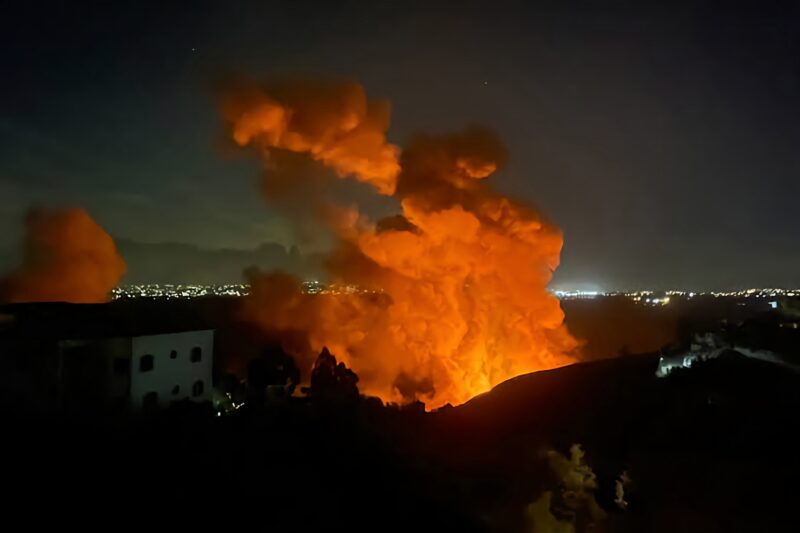Escalation of military action, the Israeli Air Force (IAF) executed a powerful airstrike on Hezbollah’s underground headquarters, dealing a severe blow to the terrorist group’s operational capabilities.
The precision strike targeted multiple Hezbollah strongholds along Israel’s northern border with Lebanon, killing at least 50 Hezbollah terrorists, including six high-ranking commanders. The move comes amidst rising tensions in the region as Hezbollah has continued its aggressive posturing against Israel.
This operation was conducted based on detailed intelligence from Israel’s Military Intelligence Directorate, which worked closely with the Northern Command and Operations Directorate. The IAF deployed over 100 fighter jets to strike key Hezbollah units, including the Natzer, Bader, and Aziz units, as well as the elite Radwan forces. These groups had been preparing for a large-scale operation targeting Israeli communities along the northern border, as part of Hezbollah’s long-standing “conquer the Galilee” plan.
Among the commanders eliminated in the strikes were Ahmad Hassan Nazal, the head of Hezbollah’s Radwan forces responsible for the Bint Jbeil sector, and Hussein Talal Kamal, the chief of operations for the Ghajar sector. Other notable figures killed include artillery commanders Ali Ahmad Ismail and Abdullah Ali Dakik. These leaders had been overseeing advanced terrorist plots aimed at destabilizing northern Israel.
The IAF’s comprehensive offensive struck approximately 95 targets across southern Lebanon, severely weakening Hezbollah’s rocket-launching capabilities. In addition to the underground facilities, around 30 sites belonging to Hezbollah’s medium-range rocket unit were also destroyed, significantly diminishing the group’s ability to carry out future attacks. This large-scale operation is part of Israel’s broader efforts to neutralize threats posed by Iran-backed Hezbollah and its military infrastructure, which have grown in both scale and sophistication over recent years.
Hezbollah’s leadership has long orchestrated attacks on Israel, and this latest offensive comes at a crucial time, following months of heightened conflict along the northern front. Hezbollah, often described as Iran’s proxy in the region, has been involved in a wide range of military activities, ranging from firing rockets into Israel to planning incursions into Israeli territory.
The airstrike also coincides with broader tensions in the region, especially in the aftermath of Hamas’s attack on Israel in 2023. Hezbollah has been vocal in its support for Palestinian militant groups and has maintained a presence in Lebanon, strategically positioned near Israel’s borders. With thousands of rocket attacks launched from Lebanon since the beginning of hostilities, Hezbollah aims to pressure Israel to divert military resources away from Gaza, potentially forcing the Jewish state to fight on two fronts.
Despite calls for ceasefires from both sides in recent months, Hezbollah has continued its military campaign against Israel. Israeli officials, however, have made it clear that they will not tolerate Hezbollah’s aggression. Defense Minister Yoav Gallant has reiterated that Israel is prepared to defend itself against any threat to its sovereignty, whether from Gaza or Lebanon.
The impact of these strikes on Hezbollah’s military capability could be far-reaching. By targeting key operational commanders and infrastructure, Israel has severely disrupted Hezbollah’s chain of command and its ability to carry out coordinated attacks. This comes at a time when Hezbollah has been ramping up its rhetoric and preparing for larger offensives against Israel.
The strikes also serve as a message to Iran and other regional actors that Israel remains vigilant in defending its borders and will take swift action to eliminate threats. With tensions running high across the Middle East, the situation along Israel’s northern front remains fluid and volatile.
The IAF’s actions have been widely covered by local and international media, emphasizing Israel’s determination to neutralize Hezbollah’s capabilities and to prevent future attacks on its civilians. The operation, although successful in its tactical goals, is likely to draw further condemnation from Hezbollah and its allies, potentially escalating the conflict further.
As of now, Israel has continued to monitor the situation closely, with additional forces deployed along the northern border to guard against any retaliatory attacks by Hezbollah. The situation remains tense, with both sides preparing for potential further military engagements in the near future.









Join our Channel...